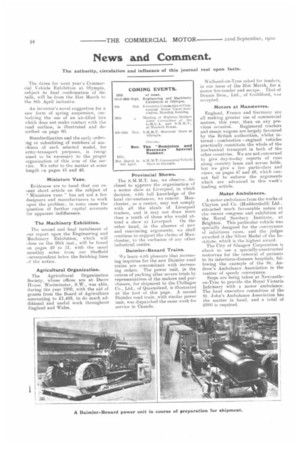News and Comment.
Page 12

If you've noticed an error in this article please click here to report it so we can fix it.
The authority, circulation and influence of this journal rest upon facts.
The dates for next year's Commercial Vehicle Exhibition at Olympia, subject to final confirmation of details, will be from the 31st March to -the 8th April inclusive.
An inventor's novel suggestion for a new form of spring suspension, embodying the use of an air-filled tire which does not make contact with the road surface, is illustrated and described on page 60.
Standardization and the early ordering or subsidizing of numbers of machines of each selected model, for army-transport purposes, is recognized to be necessary to the proper organization of this arm of the service. We refer to the matter at some length on pages 45 and 46.
Miniature Vans.
Evidences are to hand that our recent short article on the subject of " Miniature vans " has set not a few designers and manufacturers to work upon the problem ; in some cases the question of further capital accounts for apparent indifference.
The Machinery Exhibition.
The second and final instalment of our report upon the Engineering and Machinery Exhibition, which will close on the 26th inst., Will be found on pages 49 to 51, with the usual monthly notes from our Sheffield (.orre,spondent below the finishing lines Of the notice.
.Agricultural Organization.
The Agricultural Organization Society, whose offices are at Deere House, Westminster, S.W., was able, during the year 1909, with the aid of grants from the Board of Agriculture amounting to £1,468, to do much additional and useful work throughout England and Wales. Provincial Shows.
The S.M.M.T. has, we observe, declined to approve the organization of a motor show at Liverpool, in which decision, with full knowledge of the local circumstances, we concur. Manchester, as a centre, may not comply with all the ideals of Liverpool traders, and it may not draw more than a tenth of those who would attend a show at Liverpool. On the other hand, in the absence of new and convincing arguments, we shall continue to support the claims of Manchester, to the exclusion of any other industrial centre.
DaimlerRenard Trains.
We learn with pleasure that increasing inquiries for the new Daimler road trains are concomitant with increasing orders. The power unit, in the course of packing after severe trials by representatives of the makers and purchasers, for shipment to the Chillagoe Co., Ltd., of Queensland, is illustrated at the foot of this page. A second Daimler road train with similar power unit, was dispatched the same week for service in Canada.
Wallsend-on-Tyne asked for tenders, in our issue of the 31st March, for a motor fire-tender and escape. That of Dennis Bros., Ltd., of Guildford, was accepted.
Motors at Manteuvres.
England, France and Germany are all making greater use of commercial motors, this year, than on any pre vious occasion. Registered tractors and steam wagons are largely favoured by the British authorities, whilst internal combustion engined vehicles practically constitute the whole of the mechanical transport in both of the other countries. We are not.concerned to give day-to-day reports of runs along country lanes and across fields. but we give a few particulars and views, on pages 47 and 48, which cannot fail to enforce the arguments which are advanced in this week's leading article.
Motor Ambulances.
A motor ambulance from the works of Clayton and Co. (Huddersfield) Ltd., attracted much favourable notice at the recent congress and exhibition of the Royal Sanitary Institute, at Brighton. This particular vehicle was specially designed for the conveyance of infectious cases, and the judges awarded it the Silver Medal of the Institute, which is the highest award.
The City of Glasgow Corporation is about to use a specially-constructed motorvan fur the removal of patients to its infectious-diseases hospitals, following the example of the St. Andrew's Ambulance Association in the matter of speedy conveyance.
Steps are being taken at Newcastleon-Tyne to provide the Royal Victoria Infirmary with a motor ambulance. The local executive committee of the St. John's Ambulance Association has the matter in hand, and a total of 600 is required.
























